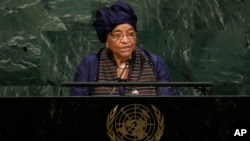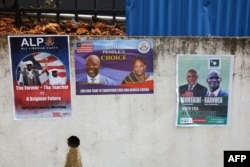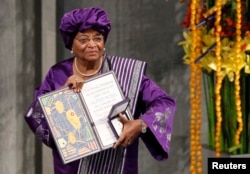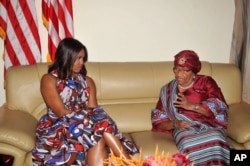Democracy is strengthening not just in Liberia, but across West Africa, the president of Liberia says.
Ellen Johnson Sirleaf, who made history by becoming the first elected female head of state in Africa, now is intent on making history again: by ensuring that Liberia's election next month succeeds and, for the first time in 73 years, one elected leader hands off power to another.
Johnson Sirleaf spoke to VOA's Peter Clottey on the sidelines of the United Nations General Assembly this week. She said she is confident the election will be free and credible.
"Our elections commission have already established their credibility in three by-elections that have taken place, which the citizens accepted," she said. "There were no major complaints. International community, including all the observers to those elections, accepted that and said it was credible."
She noted that democracy has begun to solidify in the Economic Community of West African States (ECOWAS).
"If you look … overall, that path toward democracy is strong. There are many [countries] that have already had their political maturity tested over two or three periods, like Ghana. So, there's no turning back on democracy in West Africa," the president said.
Having stronger democratic foundations makes it easier for the ECOWAS states to cooperate on crucial regional issues, including terrorism, the president said. The region's leaders are moving forward to boost their intelligence-gathering to spot terrorism groups infiltrating the region, she added. In addition, the region needs more training for their military and border forces to better protect porous borders.
Johnson Sirleaf took office at the end of a transitional government in 2006, following decades of civil war and political fighting in the country. She said that she is proud of having helped her country maintain peace since then.
"And in the process, on the basis of that peace, restored basic services to the Liberian people" that have been missing for many years, she said, as well as rebuilding institutions that have been largely dysfunctional. The reputation and creditworthiness of the country also has been re-established, she added.
"I like to say it's a great legacy," Johnson Sirleaf said.
As part of her country's progress, Liberia has rebuilt its relationships with other countries, including the United States. Liberia's long relationship with the U.S. has persisted despite its years of war, she said.
"I have been able to strengthen that relationship," she said. "And it's a relationship that crosses party lines, so we have bipartisan support, bipartisan in Congress and in the administration. I've been very pleased with how we have strengthened, built that, broadened that relationship to go beyond the traditional and the historical, to make it something in current realities."
She said her government has shown U.S. leaders how far the country has come, and has received U.S. support for development areas. Now, Johnson Sirleaf said, American leaders see a country making progress and "it is a return on their investment."
That's a source of pride both for Liberians and Americans, she said.
With national elections in three weeks, the president said she is confident there will be a peaceful vote.
"My message to all Liberian people is to please maintain the peace, this peace that we have all made such great sacrifice for," she said.







